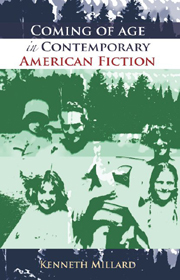Book contents
- Frontmatter
- Contents
- Acknowledgements
- Introduction: Contemporary Coming of Age – Subject to Change
- 1 In the Name of the Father
- 2 I Change Therefore I Am: Growing up in the Sixties
- 3 Citation and Resuscitation
- 4 Language Acquisition: Life Sentences
- 5 Lexicon of Love
- 6 Memoirs and Memorials
- Conclusion
- Bibliography
- Index
3 - Citation and Resuscitation
Published online by Cambridge University Press: 12 September 2012
- Frontmatter
- Contents
- Acknowledgements
- Introduction: Contemporary Coming of Age – Subject to Change
- 1 In the Name of the Father
- 2 I Change Therefore I Am: Growing up in the Sixties
- 3 Citation and Resuscitation
- 4 Language Acquisition: Life Sentences
- 5 Lexicon of Love
- 6 Memoirs and Memorials
- Conclusion
- Bibliography
- Index
Summary
Both of this chapter's novels are dedicated to dramatising the profound long-term consequences of experiences that occurred in adolescence. In particular, traumatic experiences such as bereavement are shown to be impossible to overcome, and to have lasting effects that resonate well into adulthood. These novels offer adolescence as a defining moment, but in ways that are never satisfactorily resolved. For these adult protagonists, the failure to come to terms with adolescent experiences has resulted in an adulthood characterised by atrophy, arrested development, and pathology. These conditions in the protagonist are then given a sense of national significance by the ways in which both novels show the individual to be symptomatic of a moribund culture. Both novels are also strongly characterised by their attempts to contextualise their protagonists in terms of an analysis of recent American culture: the paralysis of adolescence is a symptom of a paralysed culture: Moody's Hex is ‘stalled between consonants’, and the narrator of Eugenides' novel is similarly transfixed by adolescent experiences that have traumatised him. Further, both novels seek to locate the origin of this contemporary malaise in a specific historical moment, that is to say, they identify a point in the history of the United States in the late twentieth century at which the contemporary predicament began. It is this cultural and historical analysis that gives these two novels their distinctive value.
Both of these novels are also broadly postmodern in the way that they problematise ideas about knowledge, epistemology, and representation.
- Type
- Chapter
- Information
- Coming of Age in Contemporary American Fiction , pp. 72 - 97Publisher: Edinburgh University PressPrint publication year: 2007



